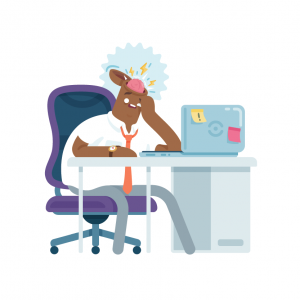How to Manage Stress – Symptoms, Sources & Solutions
Guest blogger, Steve, has worked in the security industry for over 15 years, where dealing with stressful situations is part and parcel of his working day. He shares helpful information on how to manage stress – by understanding the symptoms and common causes, and following simple steps to alleviate the situation.

Stress is our bodies’ reaction to an emergency, and it prepares us for “fight or flight.” Yet, too much of this pressure can lead to physical and mental health problems. Students and recent graduates are likely to experience stress. Learn to recognise the symptoms and sources so that you can better manage the situation.
Stress Symptoms
Anxiety may cause temporary symptoms such as a racing heartbeat or sweating. But you might also experience physical ailments that you do not immediately associate with the pressure of stress.
Headaches
Tension headaches are the most common type of headache in adults and are often caused by stress.
Insomnia
Note if you are having trouble falling asleep or are regularly waking up in the night.
Pain or poor health
Stress can cause the body to produce more cortisol, which may lead to chronic pain. You may also be more likely to catch a cold or another virus.
Digestive problems
Stomach pain, diarrhoea, and constipation may be a result of stress. It is also likely that stress will worsen existing digestive issues.
Depression
Long-term stress can lead to depression and other mental health issues.
Sources of Student Stress
Many think of student life as youthful fun and excitement, but it can also be a time of pressure and struggle. These are a few typical causes of student stress.

Expectations
Unreasonable expectations from parents, peers, or even yourself can lead to pressure and anxiety.
Competition
The need to “win” in an academic setting can be very stressful.
Homesickness
It’s not only first-year students who miss their home life. Pining for the familiarity of home, friends, and family can affect students at any stage.
Social anxiety
College/university may be the first time you deal with many new social situations. Peer pressure is magnified, and you may take some time to develop self-confidence.
Sources of Graduate Stress
The period after graduation is one of the most significant transitions in life, and many people struggle with the change. Knowing some of the causes of post-commencement stress (where you experience a mixture of excitement and fear of the unknown) may help you, or a graduate you love.
Employment
Looking for a job is stressful, but starting a new job can also be challenging. You may feel overwhelmed, and the learning curve is often steep.
Parents
You may feel that your parents have very high expectations for you after graduation. And you may have moved back home and are adjusting to living with your parents as an adult.

Money
Living expenses, student debt, and finding a well-paid job may all cause anxiety.
Adulting
In an academic environment, many routine tasks may have been handled for you. Post-graduation you will need to sort your own accommodation, find your doctors and dentists, obtain insurance, pay your taxes, cook healthy meals, and wash your own clothes!
Identity
Moving from the academic to the work world will change how you identify yourself and how others identify you. Sometimes these views conflictm or you feel confused about these changes.
Solutions
The good news is that students and graduates can manage their stress. Follow these few simple steps to calm your anxiety and ease your way through this exciting time of life.
Make a plan
The first step to solving a problem is a plan of attack. Make a list of all the steps you need to take to find a job. Put together a spreadsheet to manage your finances and set up a budget. Or, if you are still at university , keep a detailed calendar of all assignments and tests. These small acts of taking control are great stress reliever.
Manage expectations
So much of the pressure we feel is self-imposed. Remember that you are not perfect, and that’s OK! You do not have to get your dream job on the first shot. Don’t beat yourself up over a B. And don’t forget to celebrate your successes!

Stay healthy
Taking care of yourself is one of the best defences against stress. Eat healthily, get enough sleep, exercise regularly, and give meditation a try. Stress itself might make it difficult to do all of these at first, but work to establish a routine, and you will soon have the upper hand.
Conclusion
The body reacts in lots of different ways to stress and when deadlines are looming or you are finding it difficult to get the job you have worked so hard for, pressure can build up.
Acknowledging the causes of stress and breaking those down into three categories can help alleviate the burden:
- Things you can fix
- Things that solve themselves naturally
- Things you have no control over
You won’t be able to do anything about all of the stresses in your life, but focus on solving the first set, waiting out the second set and not worrying so much about the third.
About the author
This is part of a larger guide written by Steve Johnson about anger management techniques. Having worked in the security industry for over 15 years he has learnt to manage himself in stressful environments.
Find out more about dealing with stress:
Stress Busters
How to limit the negative effects of stress if you start to feel overwhelmed
SOS Professional Help
If you need help or just want to talk, click here for professionals & organisations experienced in supporting young people

Please log in or sign up to comment